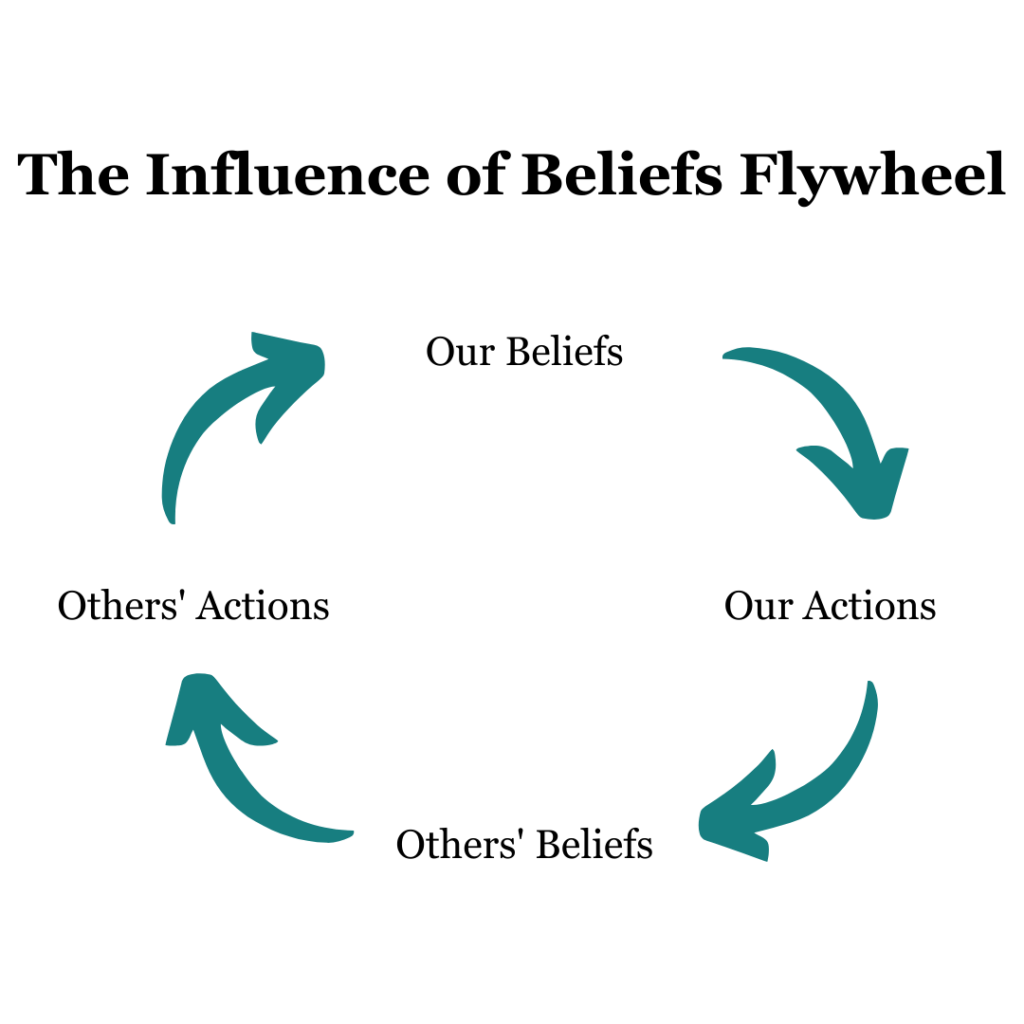Beware your beliefs: they have the power to influence others. Both positively and negatively. That’s the power of the Pygmalion Effect.
Our minds are powerful machines. They process enormous amounts of information every day to make sense of the world around us. We then use that processed information to interact with the world. Those interactions have consequences.
One of the major consequences of our interactions is that we have the power to influence others. Who they are. What they do. Who they become. Both positively and negatively. This realization is foundational for everyone, but especially those in positions of power, such as leaders, coaches, teachers, and parents. When we are aware of how our beliefs influence others, we can then be intentional with our actions. And that makes us more effective.
There is something important to note about the process of impacting the performance of others by broadcasting our beliefs of them. After we influence their performance, their altered behavior then impacts our perception of them. We observe how well they do something—after showing our cards by making clear what we think of their abilities—and are oftentimes vindicated with our original appraisal. It’s a cycle, a type of feedback loop called a flywheel where the parts of the cycle self-reinforce subsequent parts. When the cycle is reinforced favorably, we positively influence people to great effect, helping them realize higher heights of performance. When the cycle is reinforced negatively, the ramifications are detrimental to ourselves and those around us.

The Pygmalion Effect Plays Into Confirmation Bias
As the image above shows, the product of our beliefs cycles back to us in ways that might not be obvious in real-time. This could be for a multitude of reasons, such as a long time period before we get the feedback, we didn’t realize others intuit our beliefs, or we just don’t think we have that kind of power. Regardless, when we believe something about someone else—and that belief influences our behavior around them in such a way that it impacts who they believe themselves to be—they will think and act in ways that are similar to the energy we put out in the first place. The result of this is that we then see what we originally believed: our thoughts are confirmed.
This is dangerous because it feeds into the pervasive confirmation bias. Confirmation bias is where we only see what aligns with our beliefs; we don’t see the whole picture. The Pygmalion Effect creates the incomplete picture that deceives us into thinking our beliefs are right. Even if our views are proved right about a person, is it worth it if we are the ones who might have created the wrong picture of that person in the first place?
Using the Pygmalion Effect in Our Favor
How we treat others is a significant factor in how they perform. As a leader in a business, a coach on a team, a teacher in the classroom, or a parent at home, we must shape our beliefs to get the best out of those in our charge. This takes many forms but ultimately produces outcomes that better all parties involved.
If we take man as he is, we make him worse. But if we take him as he should be, we make him capable of becoming what he can be.
Johann Wolfgang von Goethe
Business Leaders
As a leader, it’s our job to empower, support, and foster growth in our team members. When we do that well, the benefits show. Staff members are capable of more, and their confidence grows. They take on more responsibility and provide better service to customers and clients. They in turn support and mentor others. The environment becomes collaborative and the company culture thrives. We must lead by example, and that starts with how we form our beliefs. By showing others that we believe in their abilities, we are laying the groundwork for organizational success.
Coaches
Coaches teach and inspire their team so the members perform optimally as individuals and as a collective. Because of their position, coaches are highly influential members of the team. Their perspectives can make the team better, or mire it in self-doubt and negativity. Good coaches inspire the team to be more than they presently are. This sets the team up for long-term success. And it requires seeing the potential of their team and believing in what they can become. That belief is what sets the Pygmalion cycle into motion.
Teachers
Teachers are much like coaches. They help others grow through education. And studies have shown the enormous impact teachers have on their pupils. For example, a teacher who thinks a student is bad at math can inadvertently hinder that student’s ability to learn math by tamping down their expectations. It is therefore crucial that teachers be cognizant of their influence on students. A tough subject is made all the more difficult by a teacher signaling to you your deficiency. And when we are talking about an elementary subject upon which others are learned, it is even more important for teachers to show that they believe in the abilities of their students to learn whatever subject they are teaching.
Teachers have the monumental duty of doing this day-in and day-out with a significant number of students at a time. Because of this importance, good teachers need to be supported, compensated, and cherished.
Parents
Parents have the all-important job of child-rearing, teaching their kids to be resilient, caring, and capable people. We see from past generations how parenting styles and expectations have influenced the way children were raised. For example, it was widely accepted that boys would be educated for certain jobs that were either influential or required manual exertion. Girls were groomed to become moms who would tend to family affairs. Their education was correspondingly sparse. Parents told their sons to get a good job; they told their daughters to get a good husband.
As a result, girls were siphoned off from education and careers. The belief that women weren’t meant to (or able to) be educated and perform the same tasks as men surely influenced the belief that many women had in themselves. And that seed of doubt was often planted at home.
Imagine what society might have looked like today had we empowered all people by simply believing in their potential. Imagine what the future will look like if we don’t do that now.
Conclusion
People of all types have the power to influence the beliefs and, subsequently, the performance of others. Indeed, this phenomenon is not only confined to the types of people outlined in this post. It is all-encompassing. But some people hold more influence over us than others. The greater the impact we can make on others, the more intentional we must be about how we behave around them.
We have the power to bring out the best in others. Think about that. The way we perceive others, what we choose to see in them, influences who they are and what they do. That’s incredible. And daunting.
Our power means we have a responsibility to others. One that we might not inherently want. Or even be aware of it in some instances. While it’s uncomfortable, scary things evoke strong emotions in us for important reasons. They are indicators telling us that what we do is important and we need to be intentional with how we conduct ourselves.
The mind is a powerful tool that maps out the world around us. We can use it to see the shortcomings in others and then broadcast that to them, influencing their trajectory of growth. Or we can choose to see all the possibility that abounds in those around us. Only then can we be a source of inspiration for them, helping them become more than they currently are. And when we help others around us, we ultimately help ourselves as well.
Do the best you can until you know better. Then when you know better, do better.
Maya Angelou

